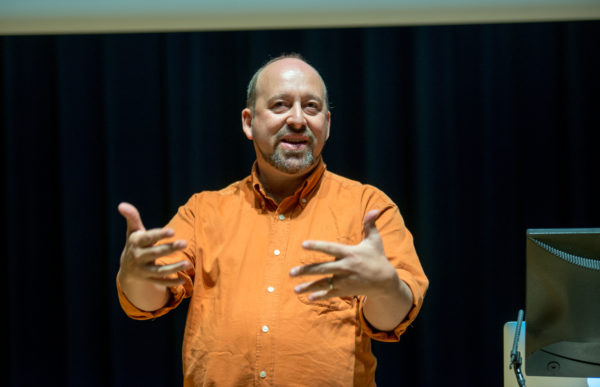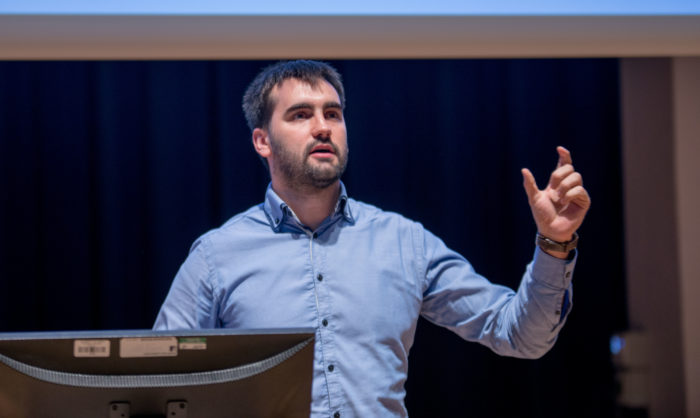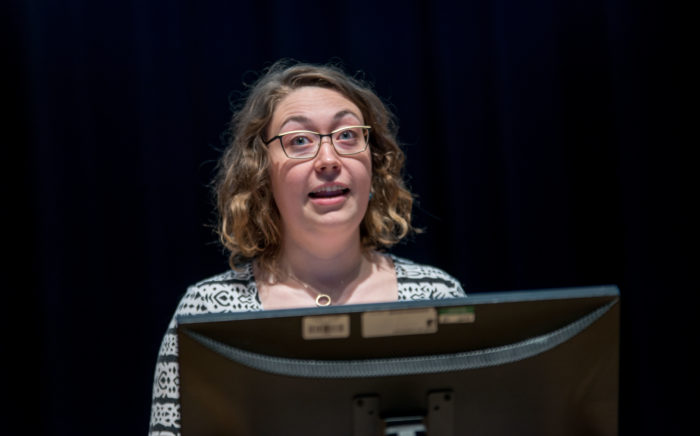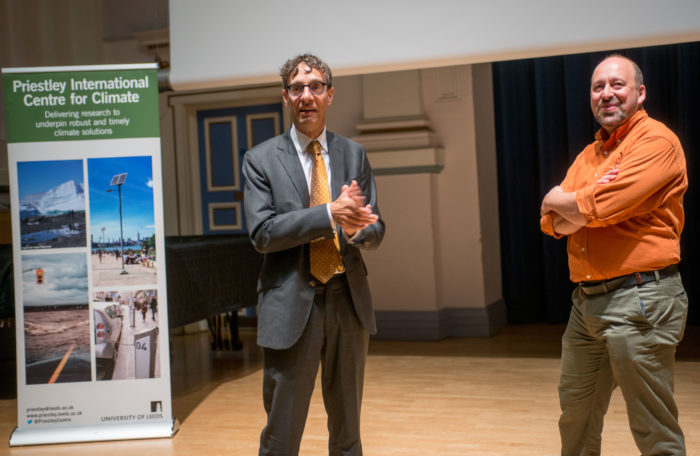Call for climate scientists “to help the world make better choices”

A moving tribute was paid to astronaut and climate scientist Piers Sellers by Gavin Schmidt, Director of NASA Goddard Institute for Space Studies (GISS), at the annual prize giving event in Dr Sellers’ name.
Gavin Schmidt, who worked under Piers Sellers for five years at NASA, said Piers Sellers had a talent for focussing on the big picture, calling him “an exceptional person at knowing what mattered”.
“He was an inspirational leader, he was a great scientist and he was a fun guy,” Gavin Schmidt said, describing Sellers’ adventurous spirit and motivational qualities.
“From going to space and back to his last journey, fighting cancer, which he went through, still working, he encouraged everybody at NASA to be continually pushing to make things better for other people.”
The emotional homage to the former Leeds alumnus, who gave his name to two climate prizes for the Priestley International Centre for Climate, came at the conclusion of the keynote address given by the NASA-GISS director at the Piers Sellers PhD Prize 2018 on Monday 18 June.
This year the postgraduate prize, given for exceptional research by a current University of Leeds PhD researcher, was awarded to two recipients: Jesus Vergara Temprado of the School of Earth and Environment for his work on climate models and clouds, and Kate Palmer of the CDT Low Carbon Technologies for the impact of her research on battery electric vehicles. (Read more about the winners and their research.)

Jesus Vergara Temprado, one of two winners of the Piers Sellers PhD Prize 2018 (photo: Mark Bickerdike)
Gavin Schmidt, who presented the prizes, went on to talk about learnings from his own career and how it evolved from climate modelling to science communication. Describing how the change came about, he said his frustration with the lack of response from the scientific establishment to the 2004 blockbuster movie, The Day After Tomorrow, was a turning point.
“I remember feeling like why is this not a bigger issue, why are we not capitalising on even .01% of people that watched this movie that might have had a question about climate change?”
He and others started the award-winning Real Climate blog as a result, “to go to the people who really care and talk to them straight about climate change”.
Engaging with people about climate change – which Schmidt has done via a variety of means from a popular TED Talk to a book of photography (Climate Change: Picturing the Science, with Joshua Wolfe) and taking on all comers on Twitter (as @ClimateOfGavin; he has 32.9K followers) – means having to “divorce yourself from your internet doppelganger” he admitted.

Kate Palmer, of the Centre for Doctoral Training in Low Carbon Technologies, who won for her research impact on electric vehicles (photo: Mark Bickerdike)
“As a public scientist there’s people who talk about you, your name, your institution, your publications – but the person they are talking about is the worst person in the world! And you think no, that’s not me! And you’re right, it’s not you. It’s very important to remember that most of the time, when you are being conjured, they aren’t talking about you. They are talking about you representing something that they find offensive or unflattering.”
While public engagement has had its challenges, Schmidt remains positive about his role as a communicator, emphasising the importance of listening to people and responding to questions. A series of animated graphs on attribution that NASA GISS did for Vox (What’s Really Warming the World?), which has had millions of views, was “probably the best data visualisation that we’ve done because it answered a very specific question that people are always asking, and that’s key.”
He summed up his address with a quote from Frank Sherwood Rowland, a chemist who was awarded the Nobel Prize for his work on the hole in the ozone layer: “What’s the use of having developed a science well enough to make predictions if, at the end, all we are willing to do is stand around and wait for them to come true?”

Piers Forster, Director of the Priestley International Centre for Climate, with Gavin Schmidt, Director of NASA GISS (photo: Mark Bickerdike)
Citing Piers Sellers’ inspirational example, Schmidt concluded with a passionate call to action to the audience of mainly climate researchers, reminding them their work “isn’t a purely academic exercise”.
“We’re not willing to wait for [the predictions] to come true. We want to make them change. And we have to, because we know stuff that other people don’t. And if we don’t use our knowledge to help society make better choices, what are we doing?”
The Piers Sellers prize for a world leading contribution to solution-focussed climate research was awarded earlier in the year to Professor Mark New of Cape Town University. Read more here
Main image: Gavin Schmidt, Director of NASA GISS (photo: Mark Bickerdike)
